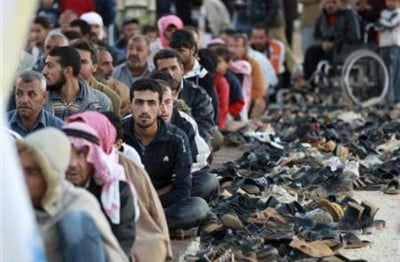Finalising Cruelty: The EU-Turkey Agreement on Refugees

It seemed a foregone conclusion, but here it was, a ghastly cuddling show between Turkish officials and Donald Tusk, President of the European Council. Both political forces had united behind a refugee containment system that is compromised from start to finish, one designed to frustrate and ultimately terminate the desire to flee lands in conflict.
The Turkish President, Recep Tayyip Erdoğan, will be finding much to muse in the arrangement, not least of all because of his boastful remark last November that he could flood Greece and Bulgaria with refugees. In stating that, the Turkish leader was very clear that he wanted some arrangement in place on how to deal with the refugee crisis in his country. There would be more cash – and incentives. The sense of blackmail in this measure has been palpable from the start.
The exchange of humans (“one-in and one-out”), which effectively monetises a humanitarian situation by convincing the Turkish authorities to accept the unaccepted human cargo from the Aegean, is again another brutal measure undertaken in the name of false logic. Such measures are designed to plug holes in the leaking edifice of regional security, one ever exacerbated by foreign interventions and power plays.
Good lashings of false generosity have been spun by public relations apologists. All sides to this seedy arrangement have suggested that they are doing asylum seekers and refugees favours while targeting the business of traffickers.
News agencies have picked up on the main line pushed by the EU and Turkey: that the deal has brought a halt to human trafficking on the Aegean. Bravo, they are saying. Things are working. Agence France-Presse (Mar 25, 2015) went through descriptions by a certain fisherman, Hasan Balci, as he played cards in a café in Bademli, noting how prior to the “EU agreement there were hundreds of refugees crossing the sea here. But now there are none.”
In a matter of days, the desperate human presence has vanished. Locals at Çeşme to the south and opposite the island of Chios, and Küçükkuyu further north, opposite the known island transit point of Lesbos, have noted the trend.
All of this has the haunting tone of bogus humanitarianism, a middleclass squeamishness that finds refuge in denying refuge using the image of the drowning and the unscrupulous operation of people smugglers as helpful alibis.
What this latently ignores is the obvious point that the smugglers are making money from validly availed rights in international refugee law. States, however, have taken it upon themselves to make sure that such rights are frustrated and only pursued in a strict and decent fashion. Even safer land routes have been closed of, starting with Greece itself, which was pressured to erect razor wire fencing to stifle movement of people from Turkey in 2012.
Marianna Fotaki of the University of Warwick accurately stated that the denial of the right to asylum on reaching the EU was against international law. “And refusing protection to unarmed people fleeing war and persecution by sending them back to Turkey, a country under threat of a civil war, is unconscionable.”[1]
To prove Fotaki’s point, a day after the EU-Turkish deal was struck, a suicide bomber killed at least five people, including himself and four foreigners, in a busy portion of Istanbul. Since October, Turkey has become accustomed to the large-scale terror strike, which have cost almost 200 lives. This has also taken place as Turkey wages its own, ever aggressive war against Kurdish separatists, some of which are also engaged in fighting the Syrian regime.
Even now, the baying critics in untouched Britain insist that more should be done. The trade in people is deemed squalid and suitably immoral to warrant righteous condemnation. Yvo Fitzherbert, penning regular screeds against the asylum tide for The Spectator, suggests that the people-smugglers of Istanbul are hardly making much of the EU-Turkish deal. “Greece is an hour away, and the Turkish coastguards do nothing to deter migrants from making the crossing.”[2]
Fitzherbert is right on the blind eye being turned by Ankara to the smuggling industry itself. (A similarly large blind eye is being turned to the ongoing oil trade between Turkish entrepreneurs and Islamic State.) This will go on, thriving as do so many other means of trade through Asia Minor. The desperate demand is there. According to a cynical former opposition politician, Aykan Erdemir, “Human smugglers will outsmart the Turkish authorities just a they have outsmarted EU authorities.”
Greece certainly lacks the means to process such arrivals, relying, instead, on the power of propaganda to discourage those inspired to make the journey. The idea of herding in orderly fashion thousands of refugees back to Turkey is not merely a gruesome prospect, but a difficult one to imagine.
Such persistent meanness continues to be the guiding principle in EU policy towards the refugee crisis. At the regional level, the failure of individual states and the EU proper to genuinely enact a mechanism by which refugees are assessed and resettled has become enshrined dogma. The costs of this venture will prove telling in time.
In the meantime, the good will of EU citizens, when manifested, will continue to demonstrate the vast gulf between institutional paralysis in Brussels and the community insistence that humanitarianism prevail. They will not be thanked for that.
Dr. Binoy Kampmark was a Commonwealth Scholar at Selwyn College, Cambridge. He lectures at RMIT University, Melbourne. Email:[email protected]
Notes
[1] http://theconversation.com/outsourcing-a-humanitarian-crisis-to-turkey-is-that-the-european-thing-to-do-55915
[2] http://www.spectator.co.uk/2016/03/what-the-people-smugglers-of-istanbul-make-of-the-eus-deal-with-turkey/

